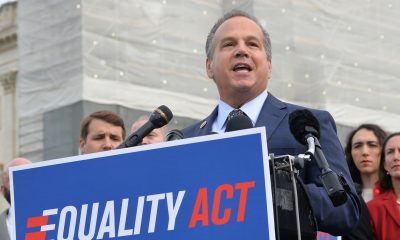National
Richard Hatch maintains his innocence
Gay ‘Survivor’ winner sees judicial system as ‘corrupt’


‘Survivor’ Richard Hatch is out of prison again and still maintains his innocence against tax evasion charges. (Photo courtesy Richard Hatch)
Richard Hatch became the first winner of the hit CBS show “Survivor” in 2000, but in the 11 years since, he’s had to survive more than backstabbing teammates, physical challenges and meals consisting of insects.
In 2006, Hatch, who is gay, was sentenced by a judge in Rhode Island to 51 months in federal prison on tax evasion charges, and was freed on probation in 2009. Prosecutors argued that Hatch failed to report his $1 million in winnings from “Survivor,” and money from subsequent public appearances. Hatch denied all charges. Earlier this year he was back in prison on charges of violating his parole after prosecutors claimed the 50-year-old reality TV star failed to re-file his 2000 federal income tax returns, a charge that Hatch denies.
“The prosecutor in this case is nothing short of a bully, and what I’ve been subjected to is nothing short of institutionalized bullying by the prosecutors, the probation department and the judge involved,” Hatch told the Blade just days after his Dec. 12 release from prison. “That’s provable, that’s observable by any objective viewers.”
“I’m absolutely innocent and have been since day one,” Hatch insisted.
Since winning “Survivor,” Hatch has been in and out of legal trouble, including a short arrest in 2009 as a result of granting several interviews with media outlets that were seen as a violation of the terms of his probation. Since his legal woes began in 2005, Hatch has maintained he never intentionally broke the law.
“It’s 2011 and they haven’t yet determined if something is owed for 2000,” Hatch told the Blade. “And all the prosecutor has done is prevented us from getting to the truth by lying to the court and claiming that my arguments aren’t valid when the IRS agents have verified everything I’ve claimed all along from day one.”
He continued, “They convicted me of attempting to evade taxes in 2006 that to this day have never been determined to be due,” Hatch said. “I filed that return in 2002 at the instruction and direction of the IRS using the numbers that they told me to use, I’ve been working with them through a tax attorney and a CPA ever since, and they have yet to complete the assessment for that year, 11 years later now.”
Hatch says he’s fully complied with the terms of his probation.
“When I was on probation, ‘Survivor’ created a show for me this ‘Redemption Island’ they invited me back to face Russell [Hantz],” Hatch told the Blade. “I’d completed my entire sentence, was on probation, perfectly compliant with anything and everything they ever asked, and probation fought the return of my passport, and prevented me, basically, from going on ‘Survivor.’”
“That’s twice now that I’ve been invited and they’ve refused to give me my passport while hypocritically lying, claiming I owe taxes — which I don’t — and arguing with the court that I’m refusing to pay them,” he continued. “So they’re blocking my ability to earn an income, and at the same time telling the court that I won’t pay. And none of it’s true.”
Hatch said that his jail time is the result of bias.
“I’ve learned how absurd these courts are. The original judge, who was biased against me, and held off his retirement to hear the case because he’d been admonished in an earlier case of mine for overstepping his bounds, he should have recused himself and didn’t — [Earnest C.] Torres — and this current judge, his mentee, his protege, William Smith, know so little about taxes they just don’t care. They listen to the prosecutor’s lies, and do whatever they tell them to do.”
“That in itself is reprehensible,” he added.
Hatch declined to answer questions about whether he’s found a job and a place to live after several media reports claimed that Hatch was homeless after his stint in prison.
“It’s just nobody’s business where I’m living and what I’m doing. I have much on my plate, I have some really fascinating opportunities that I’m working on. I’m not interested in talking about it.”
When asked whether he is homeless, Hatch replied, “Again, report whatever you’d like, I’ll give you the same answer, I don’t know where I’m staying.”
Hatch views the American justice system as deeply flawed.
“It’s not just because of my notoriety. It’s mostly because of my unconventionality, part of which is because I’m gay.”
Hatch said that unconventional people like himself — gay people, women, and African Americans — are unfairly targeted and “bullied” by a broken justice system.
“When you have people who want to take advantage of you, abuse you, persecute you, continue to feed the media caricature of this negative image, just because I’m an unconventional guy, that’s what they’ll do.”
Hatch said that the homophobia he claims he faced during his ordeal was not in prison, but in the court system.
“In prison I didn’t face anything significant that’s worth talking about as far as negativity from my peers,” he said. “I faced the same variety of subtle indignities that are brought by people in positions of power who don’t respect those positions and are insecure and otherwise mentally ill. And do things to abuse people who aren’t able to defend themselves.”
U.S. Supreme Court
Supreme Court to consider bans on trans athletes in school sports
27 states have passed laws limiting participation in athletics programs

The U.S. Supreme Court on Thursday agreed to hear two cases involving transgender youth challenging bans prohibiting them from participating in school sports.
In Little v. Hecox, plaintiffs represented by the ACLU, Legal Voice, and the law firm Cooley are challenging Idaho’s 2020 ban, which requires sex testing to adjudicate questions of an athlete’s eligibility.
The 9th U.S. Circuit Court of Appeals described the process in a 2023 decision halting the policy’s enforcement pending an outcome in the litigation. The “sex dispute verification process, whereby any individual can ‘dispute’ the sex of any female student athlete in the state of Idaho,” the court wrote, would “require her to undergo intrusive medical procedures to verify her sex, including gynecological exams.”
In West Virginia v. B.P.J., Lambda Legal, the ACLU, the ACLU of West Virginia, and Cooley are representing a trans middle school student challenging the Mountain State’s 2021 ban on trans athletes.
The plaintiff was participating in cross country when the law was passed, taking puberty blockers that would have significantly reduced the chances that she could have a physiological advantage over cisgender peers.
“Like any other educational program, school athletic programs should be accessible for everyone regardless of their sex or transgender status,” said Joshua Block, senior counsel for the ACLU’s LGBTQ and HIV Project. “Trans kids play sports for the same reasons their peers do — to learn perseverance, dedication, teamwork, and to simply have fun with their friends,” Block said.
He added, “Categorically excluding kids from school sports just because they are transgender will only make our schools less safe and more hurtful places for all youth. We believe the lower courts were right to block these discriminatory laws, and we will continue to defend the freedom of all kids to play.”
“Our client just wants to play sports with her friends and peers,” said Lambda Legal Senior Counsel Tara Borelli. “Everyone understands the value of participating in team athletics, for fitness, leadership, socialization, and myriad other benefits.”
Borelli continued, “The U.S. Court of Appeals for the Fourth Circuit last April issued a thoughtful and thorough ruling allowing B.P.J. to continue participating in track events. That well-reasoned decision should stand the test of time, and we stand ready to defend it.”
Shortly after taking control of both legislative chambers, Republican members of Congress tried — unsuccessfully — to pass a national ban like those now enforced in 27 states since 2020.
Federal Government
UPenn erases Lia Thomas’s records as part of settlement with White House
University agreed to ban trans women from women’s sports teams

In a settlement with the Trump-Vance administration announced on Tuesday, the University of Pennsylvania will ban transgender athletes from competing and erase swimming records set by transgender former student Lia Thomas.
The U.S. Department of Education’s Office for Civil Rights found the university in violation of Title IX, the federal rights law barring sex based discrimination in educational institutions, by “permitting males to compete in women’s intercollegiate athletics and to occupy women-only intimate facilities.”
The statement issued by University of Pennsylvania President J. Larry Jameson highlighted how the law’s interpretation was changed substantially under President Donald Trump’s second term.
“The Department of Education OCR investigated the participation of one transgender athlete on the women’s swimming team three years ago, during the 2021-2022 swim season,” he wrote. “At that time, Penn was in compliance with NCAA eligibility rules and Title IX as then interpreted.”
Jameson continued, “Penn has always followed — and continues to follow — Title IX and the applicable policy of the NCAA regarding transgender athletes. NCAA eligibility rules changed in February 2025 with Executive Orders 14168 and 14201 and Penn will continue to adhere to these new rules.”
Writing that “we acknowledge that some student-athletes were disadvantaged by these rules” in place while Thomas was allowed to compete, the university president added, “We recognize this and will apologize to those who experienced a competitive disadvantage or experienced anxiety because of the policies in effect at the time.”
“Today’s resolution agreement with UPenn is yet another example of the Trump effect in action,” Education Secretary Linda McMahon said in a statement. “Thanks to the leadership of President Trump, UPenn has agreed both to apologize for its past Title IX violations and to ensure that women’s sports are protected at the university for future generations of female athletes.”
Under former President Joe Biden, the department’s Office of Civil Rights sought to protect against anti-LGBTQ discrimination in education, bringing investigations and enforcement actions in cases where school officials might, for example, require trans students to use restrooms and facilities consistent with their birth sex or fail to respond to peer harassment over their gender identity.
Much of the legal reasoning behind the Biden-Harris administration’s positions extended from the 2020 U.S. Supreme Court case Bostock v. Clayton County, which found that sex-based discrimination includes that which is based on sexual orientation or gender identity under Title VII rules covering employment practices.
The Trump-Vance administration last week put the state of California on notice that its trans athlete policies were, or once were, in violation of Title IX, which comes amid the ongoing battle with Maine over the same issue.
New York
Two teens shot steps from Stonewall Inn after NYC Pride parade
One of the victims remains in critical condition

On Sunday night, following the annual NYC Pride March, two girls were shot in Sheridan Square, feet away from the historic Stonewall Inn.
According to an NYPD report, the two girls, aged 16 and 17, were shot around 10:15 p.m. as Pride festivities began to wind down. The 16-year-old was struck in the head and, according to police sources, is said to be in critical condition, while the 17-year-old was said to be in stable condition.
The Washington Blade confirmed with the NYPD the details from the police reports and learned no arrests had been made as of noon Monday.
The shooting took place in the Greenwich Village neighborhood of Manhattan, mere feet away from the most famous gay bar in the city — if not the world — the Stonewall Inn. Earlier that day, hundreds of thousands of people marched down Christopher Street to celebrate 55 years of LGBTQ people standing up for their rights.
In June 1969, after police raided the Stonewall Inn, members of the LGBTQ community pushed back, sparking what became known as the Stonewall riots. Over the course of two days, LGBTQ New Yorkers protested the discriminatory policing of queer spaces across the city and mobilized to speak out — and throw bottles if need be — at officers attempting to suppress their existence.
The following year, LGBTQ people returned to the Stonewall Inn and marched through the same streets where queer New Yorkers had been arrested, marking the first “Gay Pride March” in history and declaring that LGBTQ people were not going anywhere.
New York State Assemblywoman Deborah Glick, whose district includes Greenwich Village, took to social media to comment on the shooting.
“After decades of peaceful Pride celebrations — this year gun fire and two people shot near the Stonewall Inn is a reminder that gun violence is everywhere,” the lesbian lawmaker said on X. “Guns are a problem despite the NRA BS.”
















